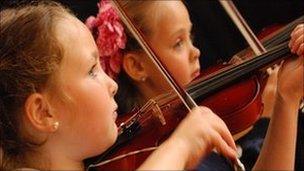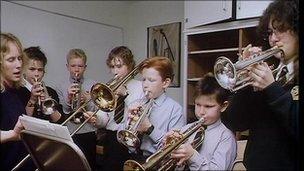Fears for future of school music lessons
- Published

There are concerns about the loss of music lessons as budgets are cut
School music lessons could be hit as local councils make savings and school budgets are redrawn, it is feared
One in five music services, which support schools, expect councils will completely axe their grants and half fear cuts of up to 50%, a survey suggests.
The Federation of Music Services warned that some services which help provide subsidised lessons could collapse.
The government said all pupils should be able to learn an instrument or sing.
It has commissioned a review of music provision in schools, being carried out by Classic FM head Darren Henley, but this is not due to report until January.
However, local authorities in England which face cuts of about a third, get their funding allocations in early December.
It is clear from the federation's survey of 158 music services in England, Wales and Northern Ireland, that many are already planning cuts with some preparing to axe the funding completely.
Local authorities provide just one strand of funding for school music services, with the rest coming from central government grants and parental contributions.
But the expected cuts come as schools face a huge shake-up of their budgets. A number of schemes dedicated to supporting school music face cuts or being channelled into a general schools budget for redistribution.
The Department for Education later said it had not yet taken a decision on the main £82.5m Music Standards Grant and would not do so until the Henley review had reported.
But it would not guarantee that the money would be ring-fenced within schools.
'Steep decline'
Federation of Music Services (FMS) chief executive Virginia Haworth-Galt said: "We recognise the pressure many local authorities are under but would urge them to them to hold back their plans until we know the results of the Henley Review.
"Music and our children's education are too important to be jettisoned like this particularly when we know that 91% of the public back music education in schools."
She added that the FMS would be very disappointed if the music grant went directly into schools' budgets without any ring-fencing for music education.
"This situation occurred in the early 1990s with disastrous results; music went into a steep decline as the monies were spent elsewhere in schools. This is a music lesson that should not be repeated," she added.
Conductor of the Bedforshire Youth Orchestra Michael Rose says music services in his area, Central Bedfordshire, are set to have budgets and teaching staff cut to zero.
He said as music services were non-statutory they were particularly vulnerable in the present climate of cuts.
He said: "If funding is lost in this way music lessons will become the sole preserve of the middle classes."
He added: "Instrumental teaching in the county's schools is provided by a central staff of highly qualified instrumental teachers. It has resulted in literally many thousands of children having the experience of learning an instrument."

Ministers say they want all pupils to be able to learn a musical instrument
Schools minister Nick Gibb said too many children in state schools were denied the opportunity to learn to play a musical instrument.
This was why he had launched a major review of how music is taught and enjoyed in schools to help make sure all pupils get an opportunity to learn to play an instrument and to sing.
Its recommendations would determine how future funding could be best used in the future, he added.
'Shocking'
"Evidence tells us that learning an instrument can improve young people's numeracy and literacy skills and their behaviour.
"It is also simply unfair that the pleasure of musical discovery should be the preserve of those whose parents can afford it."
"As part of that review recommendations will be made to determine how future funding can best be used," he said.
He added that decisions on central funding for music would not be made until after the review had reported.
General secretary of the National Union of Teachers Christine Blower said the cuts to music in schools were even more shocking in light of Michael Gove's announcement that he would be holding a review into music education in schools, claiming that it was a "sad fact" that too few state school children learnt an instrument.
She added: "Music in schools makes a contribution way beyond the straightforward exercise of learning an instrument.
"Children and young people can experience coming together in a creative environment which benefits them in other aspects of their school life."
- Published24 September 2010